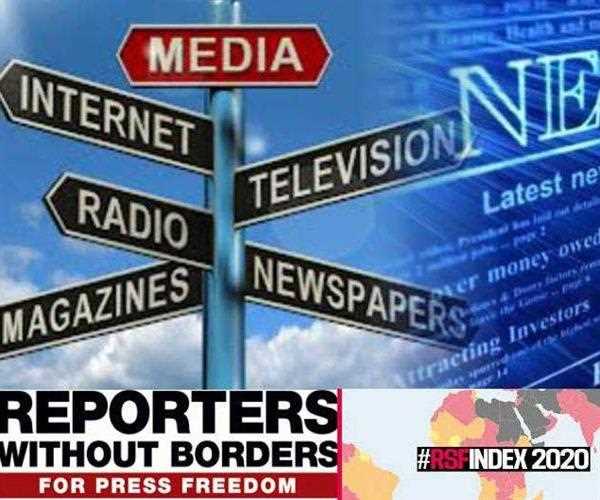
09-May-2020
RSF Press Freedom Index Does Not Have Any Idea About India
The Paris-based non-governmental organization Reporters Without Borders, or RSF, has come out with the latest list of freedom status available to journalists in various countries. In this, India is ranked 142nd out of 180 countries, the world's largest, vibrant and liberal democracy. India was ranked 140 in the previous list. After all, why has the RSF kept India so low in terms of freedom of the press? To know this, an organization's understanding of democracy and its functioning has to be analyzed.
RSF survey size is too small for a country with a large population like India. The RSF determines the status of press freedom from the answers given by experts to the questionnaires it has prepared. This questionnaire contains 87 questions related to media freedom, environment and self-censorship, legislative framework, transparency. RSF sent this questionnaire to 18 NGOs and 150 correspondents and researchers, human rights activists etc. Only ten percent of the respondents were foreign correspondents. One is that the size of the survey is too small for a country with a large population like India, and second, there is little information about the people who were selected to answer.
Of course, a better democratic environment is indispensable for the free press, but surprisingly the RSF has given democratic government, freedom of expression, constitutional commitment to secular values, segregation of religion and state, rights of equality before law, gender Did not give any importance to equality etc. Its discrepancy becomes more apparent when some such nations appear ahead of India in its ranking, where democracy rights are limited compared to India. In this ranking, Rubikana Faso is at number 36. Regarding this country, the US State Department's Trafficking in Persons report says that slavery still continues there. According to the Global Slavery Index, an estimated 82,000 people in this country are living under modern slavery.
Maldives ranks 79th while its constitution states that no law can be made in Maldives contrary to the principles of Islam. Non-Muslims cannot become citizens of Maldives. Oman is 135th. The constitution there states that Islamic Sharia is the basis of law. There is also no gender equality, as the constitution says that the head of the state will be a Muslim male.
Now let's look at some of the nations in the rankings of the RSF where Christianity is supposed to follow. Argentina is at number 64. Its constitution states that the federal government supports the Roman Catholic Apostolic religion. Malta is ranked 81st. Its constitution states that the religion of Malta is Roman Catholic Apostolic.
Norway ranks first in the ranking of the RSF in terms of press freedom, but its constitution stipulates the criteria for head of state stating that the king will always preach Evangelical-Lutheran religion. All are equal before the law has no place in Norway, which is under Article 14 in the Indian Constitution. The situation like Norway also ranks third in Denmark and 65th in Greece.
India, which has secularism embedded in its constitution and which has no national religion and who elects its head of state with the best traditions of parity, is placed behind countries with hereditary monarchies that have deep ties to the Church. Does the RSF want to believe that there is more pluralism in the media in religion-based countries where non-Muslims are denied citizenship? The boom in the media sector in India in the last few decades can be understood from the increasing print order of publications in various languages.
There are more than 800 TV channels in the country of which a quarter have news and current affairs. Is there any other nation with so much diversity in the media? I hope the RSF is fully aware of the consequences of non-compliance with self-censorship in Islamic countries and theocracy. He would also know something about self-censorship which is prevalent in the countries of Britain, Belgium, Netherlands, Norway, Denmark, etc., regarding his princely pride.
As far as the legislative framework relating to media is concerned, the media has adequate protections to operate independently and fearlessly under several laws made by Parliament. Transparency is another measure on which India has a high rating. All the colors of the rainbow can be seen in the bouquet of media in India, including those who are committed to communism, socialism, rightism etc. Those who complain of lack of transparency will have to see that there was an excess of leftist leanings in the past, but now all kinds of opinion are getting proper place. In fact, it is this multiplicity that ensures the free flow of information and opinion. Such a plurality is nowhere else. This can also be seen on social media, where politicians and even the Prime Minister are not spared for abusing them.
In fact the methodology adopted by RSF is highly questionable. The RSF also does not state the definition of freedom of the press. RSF work is subjective, biased, and non-transparent. For this reason, its conclusions should be challenged.

Content Writer/Journalist
I am a content writter !
Join Our Newsletter
Subscribe to our newsletter to receive emails about new views posts, releases and updates.
Copyright 2010 - 2026 MindStick Software Pvt. Ltd. All Rights Reserved Privacy Policy | Terms & Conditions | Cookie Policy